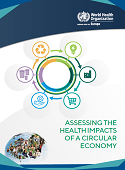Assessing the health impacts of a circular economy (2019)

Download
The extensive use of natural resources threatens to exceed the carrying capacity of the Earth. The concept of a circular economy (CE) offers an avenue to sustainable growth, good health and decent jobs, while reducing human pressure on the environment and natural resources.
Further, the change from a linear economy (take, make, dispose) to a circular one (renew, remake, share) is expected to support significantly the attainment of the Sustainable Development Goals (SDGs), particularly SDG 12 (Responsible consumption and production) and – if properly implemented – SDG 3 (Good health and well-being).
In 2018 the World Health Organization (WHO) launched its first evidence report, Circular economy and health: opportunities and risks, to facilitate and encourage the inclusion of positive and negative health effects in policy debates and to foster a proactive involvement of the health sector in these discussions.
This new report builds on the 2018 findings and expands its analysis and policy recommendations by (i) identifying existing and new approaches, methods and resources for health impact analysis; (ii) prioritizing policy recommendations to be used for CE proposals; and (iii) analysing available and additionally required materials and resources for awareness-raising on sustainable production and consumption in a health-friendly manner.



